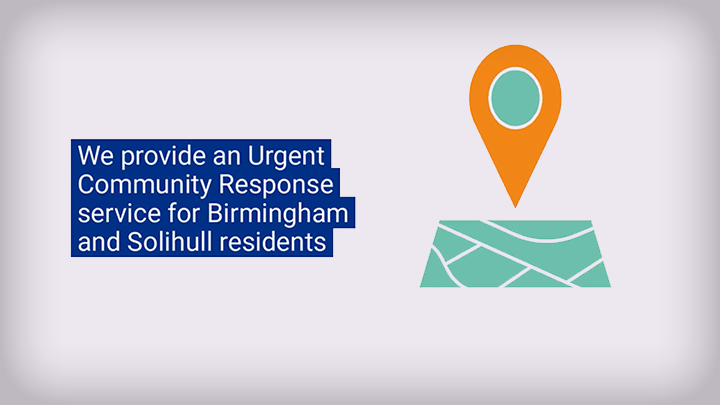
The Birmingham and Solihull Urgent Community Response (UCR) team can provide a rapid response service to people in their own surroundings within two hours. The referral service offers an alternative to calling an ambulance and helps to avoid unnecessary hospital admission or readmission.
-
All referrals are triaged and assessed by the UCR team.
-
If clinically necessary, patients will be seen in their own homes within two hours, but they may also be seen later that day or the next day if required.
-
The service is available to Birmingham and Solihull residents between 08:00 and 20:00, seven days a week.
-
UCR services have a "no wrong door" approach and work flexibly based on need, not diagnosis or condition.
Patient criteria
This service is available to anybody aged 17 years and over who lives within Birmingham or Solihull Local Authority and/or who is registered with a Birmingham or Solihull GP. It is inclusive and based on clinical and/or social need.
-
UCR team
- Advanced clinical practitioners
- Clinical practitioners
- Occupational therapists
- Adult social care staff
- Support workers
- Community support
- Physiotherapists
-
Who can refer to UCR?
- Same day emergency care (SDEC) teams
- Care homes
- GPs
- West Midlands Ambulance Service (WMAS)
- NHS 111
- Mental health services
- Community-based health and social care services
Reasons for referral
The types of patients seen include those with complex care needs or whose health has suddenly deteriorated through a fall, infection, frailty or exacerbation of an illness. These include the following:
-
Falls
No apparent serious injury or loss of consciousness
-
Mobility
Patient can't walk or is off their legs, is less mobile or has reduced coordination.
-
Pain
Increased or new onset or mild to moderate pain.
-
Breathing
Worsening shortness of breath.
-
Behaviour
Patient is more sleepy/lethargic.
-
Skin
Patient has cold hands/feet.
-
Observations
Significantly different from normal, including blood sugar.
-
Fever
Patient is shivery, feverish, or feels holt/cold or clammy.
-
Appetite
Patient is suddenly off food, or has reduced appetite or food intake, or vomiting.
-
Elimination
New offensive smelly urine or can't pass urine, or has reduced catheter output, or diarrhoea.
Guidance for care homes
The guidance on this page applies to anyone aged 17 or over in Birmingham or Solihull, including care home residents.
The following information may also be useful for those caring for care home residents.
Useful information for care homes
Emergency
If a resident has new onset chest pain/heart attack/cardiac arrest, stroke (face/arm weakness or speech problems), or sudden onset sever pain, call 999 unless patient is at end of life (please see below).
Resident of concern (non-urgent)
If patient is not their usual self, is frail, or for exacerbation of a long-term condition, contact the Enhanced Health in Care Homes and Frailty Service:
| Birmingham | 0300 555 1919 (option 2) |
|---|---|
| Solihull | 0121 424 5666 (option 2) |
Stable resident with general health condition (non-urgent)
Please add the resident to the next GP weekly home round.
Palliative resident with distressing symptoms
For additional clinical advice and support in caring for residents with palliative or end of life needs, please contact one of the following:
| Birmingham | 0300 555 1919 (option 3) |
|---|---|
| Solihull | 0121 717 4333 (option 1) |
| Hospices of Birmingham and Solihull | 0121 809 1900 (08:00 – 20:00, seven days a week) |
Contact the UCR service
Referrers should use the following contact numbers, with the exception of WMAS crews, who should continue to use their dedicated phone numbers.
-
Birmingham UCR team
-
Solihull UCR team
Watch the video

The information on this page is also available to view as an animation on our YouTube channel.
Watch the video on YouTube